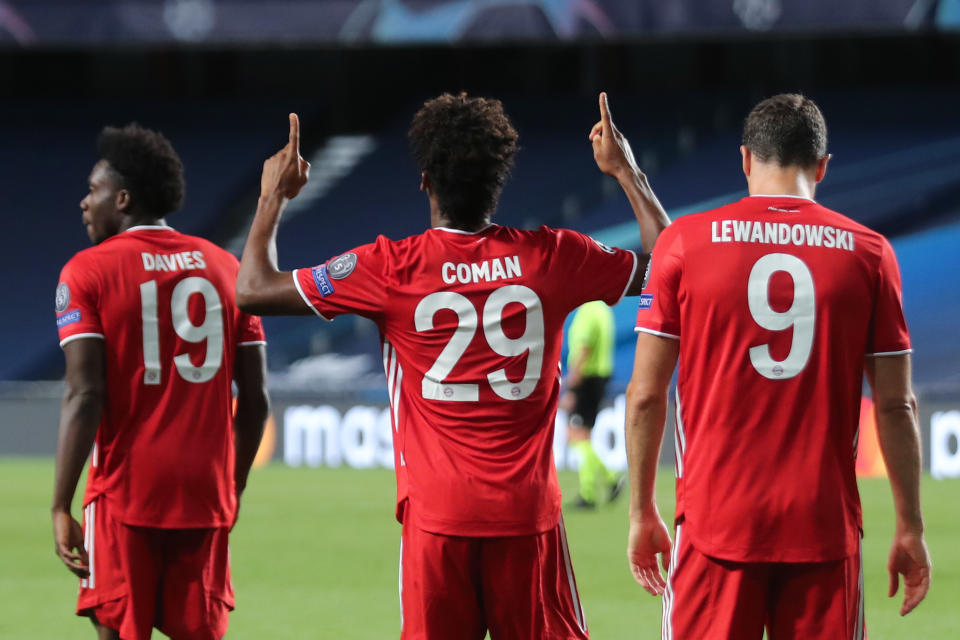Bayern Munich's relentless competence yields another Champions League crown
The Bayern Munich players poured onto the field, celebrating the club’s first European title since 2013. In an empty stadium, they screamed and cheered and cried. The vacant echoes didn’t bother them any, nor did the absence of anyone outside of the players and staff to watch them lift the iconic trophy. This title will count like any other, no matter its strange circumstances.
Bayern was the favorite, and it delivered. On Sunday, it beat Paris Saint-Germain 1-0 in a delightful Champions League final that was technical, tight, tense and abidingly entertaining. In a remarkable twist, the winner was scored by Kingsley Coman, who spent 10 years in PSG’s youth academy and became its youngest-ever first-team player before leaving and joining Bayern after a spell at Juventus.
Bayern’s European performance was imperious.
Before the final, Bayern smashed Lyon 3-0 in the semifinal without expending a whole lot of energy. It battered Barcelona 8-2 in the quarterfinal. It trashed Chelsea 7-1 in the round of 16, over two legs, back in the olden days when knockout ties still consisted of two games. Bayern won all six of its group stage games outscoring opponents 24-5, even beating last season’s Champions League finalist Tottenham Hotspur 7-2 in North London.
But the curious thing about Bayern Munich is that for all its excellence, to a non-fan, it isn’t actually a very interesting club. You might root for some other German club and loathe this Bavarian evil empire, but if you have no dog in the fight, chances are you don’t have particularly strong feelings about the modern incarnations of this global soccer juggernaut.

Bayern’s competence has been relentless. In Bayern’s 11th European final, it claimed its sixth continental crown. This also marked its second treble (Champions League, domestic league and domestic cup) in less than a decade, also winning it in 2012-13. Bayern had already claimed an eighth straight Bundesliga title this summer.
Yet there was a time when Bayern was known within Germany as “FC Hollywood” for its incessant drama. Players publicly feuded with coaches and each other. The notorious German tabloids feasted on whatever dirty laundry was aired from inside the club, which never seemed to run out. And while success was ample, it was invariably accompanied by turmoil. There has been so little of that lately. A Bavarian crisis these days usually amounts to a few games not won, or a veteran player unhappy about his playing time.
Early on this season, it looked like Bayern’s run of dominance was about to run out. Its squad was underperforming and apparently unbalanced. Manager Niko Kovac, who never quite meshed with his players or the playing style they preferred, was finally let go in early November. This time around, Bayern didn’t go after some super-manager either, just as Kovac hadn’t been an exciting pick. Instead, it promoted assistant Hansi Flick.
They last lost a game on Dec. 7.
Since then, Bayern is 29-0-1.
When the Champions League finally resumed, almost a month and a half after the Bundesliga ended, Bayern kicked into a higher gear. Flick had unloosed the club’s fleet-footed wingers and helped turn Canadian prodigy Alphonso Davies into a menacing left back marauding deep into enemy territory. He got Thomas Müller back to his best. Manuel Neuer overcame his injury and a slump and was decisive at several junctures in the final. Robert Lewandowski remained perhaps the best striker in Europe, scoring a staggering career-high 55 goals this season.
Swishing and strutting, Bayern didn’t look unbalanced any longer. It suddenly appeared perfectly positioned for the future. It wasn’t a club caught between generations now, of past-it veterans and not-yet-ready talent. Under Flick, it became a vigorous, youthful team where those in their early 20s complemented a few key veterans.
On Sunday, they weathered PSG’s early chances and methodically took control of the game. Coman’s 59th-minute winner, coming after he was denied a valid penalty and Lewandowski had struck the post, allowed Bayern to kill off the contest, a job this team knew just how to pull off.
Somehow, in spite of the difficulties of this early season, Bayern didn’t miss a beat. It kept winning. It kept doing what it hasn’t let up from in over a decade. In the last 11 campaigns, it not only has nine Bundesliga titles, but reached the Champions League final four times, winning twice. It made the semifinals four other seasons as well.
In that sense, Bayern has become the modern super club. Its image is pristine. Bad press is rare. Its brand is global and exceptionally well monetized for a team outside of the more-appealing English and Spanish leagues. It makes money hand over fist, allowing the club to compete with its fellow heavyweights in nations with richer broadcast contracts. It is a well-run business that remains a majority fan-owned, without the stain of outside investment of dubious provenance.
If it’s drama you want, Bayern isn’t your club anymore. If it’s winning, that’s a different story.
Leander Schaerlaeckens is a Yahoo Sports soccer columnist and a sports communication lecturer at Marist College. Follow him on Twitter @LeanderAlphabet.
More from Yahoo Sports:

